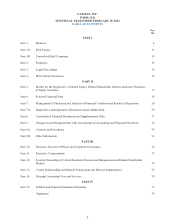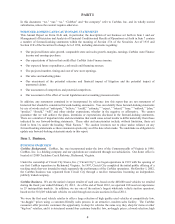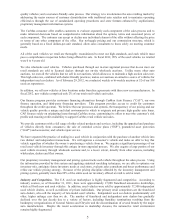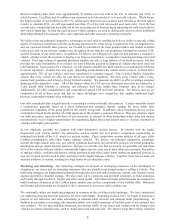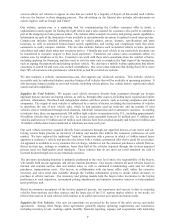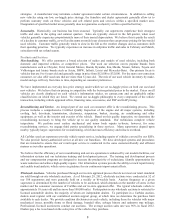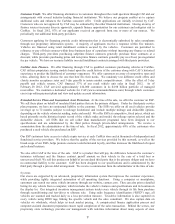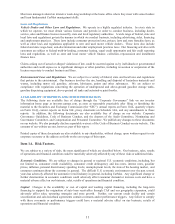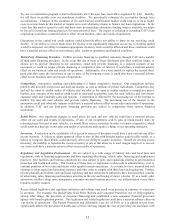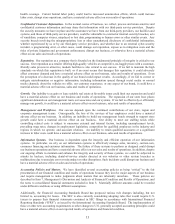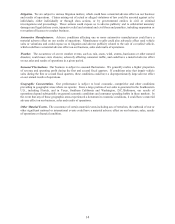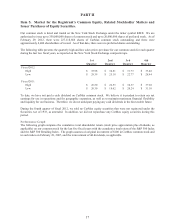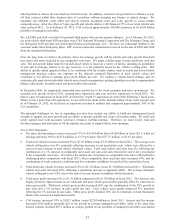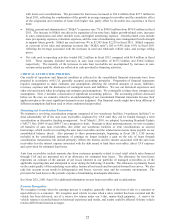CarMax 2012 Annual Report Download - page 19
Download and view the complete annual report
Please find page 19 of the 2012 CarMax annual report below. You can navigate through the pages in the report by either clicking on the pages listed below, or by using the keyword search tool below to find specific information within the annual report.13
health coverage. Current federal labor policy could lead to increased unionization efforts, which could increase
labor costs, disrupt store operations, and have a material adverse effect on our results of operations.
Confidential Customer Information. In the normal course of business, we collect, process and retain sensitive and
confidential customer information and may share that information with our third-party service providers. Despite
the security measures we have in place and the assurances we have from our third-party providers, our facilities and
systems, and those of third-party service providers, could be vulnerable to external or internal security breaches, acts
of vandalism, computer viruses, misplaced or lost data, programming or human errors or other similar events. Any
security breach involving the misappropriation, loss or other unauthorized disclosure of confidential information,
whether experienced by us or by our third-party service providers, and whether due to an external cyber-security
incident, a programming error, or other cause, could damage our reputation, expose us to mitigation costs and the
risks of private litigation and government enforcement, disrupt our business, or otherwise have a material adverse
effect on our sales and results of operations.
Reputation. Our reputation as a company that is founded on the fundamental principle of integrity is critical to our
success. Our reputation as a retailer offering high-quality vehicles at competitive, no-haggle prices with a customer-
friendly sales process in attractive, modern facilities is also critical to our success. If we fail to maintain the high
standards on which this reputation is built, or if an event occurs that damages this reputation, it could adversely
affect consumer demand and have a material adverse effect on our business, sales and results of operations. Even
the perception of a decrease in the quality of our brand could impact results. Accordingly, if we fail to correct or
mitigate misinformation or negative information, including information spread through social media or normal
media channels, about the vehicles we offer, our customer experience, or any aspect of our brand, it could have a
material adverse effect on our business, sales and results of operations.
Growth. Our inability to acquire or lease suitable real estate at favorable terms could limit our expansion and could
have a material adverse effect on our business and results of operations. The expansion of our store base places
significant demands on our management team, our associates and our systems. If we fail to effectively or efficiently
manage our growth, it could have a material adverse effect on our business, sales and results of operations.
Management and Workforce. Our success depends upon the continued contributions of our store, region and
corporate management teams. Consequently, the loss of the services of key employees could have a material
adverse effect on our business. In addition, an inability to build our management bench strength to support store
growth could have a material adverse effect on our business. Our ability to meet our staffing needs while
controlling related costs is subject to numerous external and internal factors, including unemployment levels,
prevailing wage rates, changes in employment legislation, competition for qualified employees in the industry and
regions in which we operate, and associate relations. An inability to retain qualified associates or a significant
increase in labor costs could have a material adverse effect on our business, sales and results of operations.
Information Systems. Our business is dependent upon the integrity and efficient operation of our information
systems. In particular, we rely on our information systems to effectively manage sales, inventory, carmax.com,
consumer financing and customer information. The failure of these systems to perform as designed could disrupt
our business operations and have a material adverse effect on our sales and results of operations. In addition, despite
our ongoing efforts to maintain and enhance the integrity and security of these systems, we could be subjected to
attacks by hackers, including denial-of-service attacks directed at our websites or other system breaches or
malfunctions due to associate error or misconduct or other disruptions. Such incidents could disrupt our business and
have a material adverse effect on sales and results of operations.
Accounting Policies and Matters. We have identified several accounting policies as being “critical” to the fair
presentation of our financial condition and results of operations because they involve major aspects of our business
and require management to make judgments about matters that are inherently uncertain. These policies are
described in Item 7, Management’s Discussion and Analysis of Financial Condition and Results of Operations, and
the notes to consolidated financial statements included in Item 8. Materially different amounts could be recorded
under different conditions or using different assumptions.
Additionally, the Financial Accounting Standards Board has proposed various rule changes including, but not
limited to, accounting for leases. The SEC is also currently considering adopting rules that would require U.S.
issuers to prepare their financial statements contained in SEC filings in accordance with International Financial
Reporting Standards (“IFRS”), as issued by the International Accounting Standards Board. The implementation of
these or other new accounting requirements or other changes to U.S. generally accepted accounting principles could
have a material adverse effect on our reported results of operations and financial condition.


